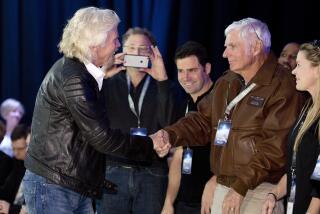Concern Rises for Voyager Pilots’ Health : Noise in Tiny Cabin Could Cause Partial Loss of Hearing
- Share via
MOJAVE — Pilots Dick Rutan and Jeana Yeager may suffer a permanent 30% hearing loss because an electronic device designed to shield them from some engine noise in the Voyager’s tiny cabin has failed, the expedition’s physician said Thursday.
Dr. George Jutila’s comments underscored the increasing concern over the physical condition of Rutan and Yeager as they passed the halfway mark in their projected 10-day around-the-world flight without refueling.
Among the other potential medical problems that loom larger with each passing hour are fatigue, dehydration, circulatory problems, altitude sickness and stress, according to many physicians familiar with the physiological effects of such flying.
On Thursday, however, Rutan and Yeager were said to be in high spirits.
Peter Riva, a Voyager spokesman, said neither pilot has reported any medical problems. “There’s no indication that either Dick or Jeana is impaired in any way,” he said.
Aside from the potential hearing loss, Jutila said in an interview here that his biggest concern is fatigue.
Jutila said he has devised a self-monitoring rating scale for fatigue that both pilots have been using. The scale ranges from 1 for no stress to 5 for near-incapacitation.
For the first time, Rutan radioed on Thursday morning that his self-rating had risen to 2, according to Jutila.
Jutila said, however, that he is not concerned about such a minor increase. “I don’t worry about Yeager,” he added. Jutila, a family physician in Fortuna, Calif., is a former U.S. Air Force flight surgeon.
When the Voyager took off from Edwards Air Force Base near here on Sunday morning, Rutan and Yeager were equipped with newly designed muff-type headsets as well as the electronic device that was to have reduced the noise level by canceling out certain frequencies.
Jutila said Rutan and Yeager are still receiving some noise protection from the headsets. He said that he is sure the pair will experience hearing loss for some time after landing and that the loss “could well be permanent.”
Any loss, Jutila added, would be more likely in the high-frequency sounds, like music, and not the lower frequency sounds, like normal conversation.
105 Decibels
The noise level in the cabin is at about 105 decibels, a level that can damage the delicate inner-ear hearing mechanism.
If it had functioned properly, the noise-canceling device should have reduced the noise reaching the inner ear to 80 or 85 decibels, according to Dr. Hening Von Gierke, a bioengineer at Wright-Patterson Air Force Base in Dayton, Ohio, where the device was developed. It is manufactured for the Air Force by Bose Inc. of Framingham, Mass.
In addition to its physical effect, noise can have strong psychological effects, experts say. For example, studies have shown that the damaging effect of noise on the hearing mechanism may be significantly influenced by whether the sound is pleasing or displeasing to the listener.
According to Dr. Arline Bronzaft, a psychologist at Lehman College in New York City, several studies suggest that sounds interpreted by the listener as pleasing may result in the brain releasing chemicals that protect the hearing mechanism from damage.
Pleasing Noise
In a telephone interview, Bronzaft speculated that for Rutan and Yeager, the noisy engine may be pleasing because it is a signal that everything is going well.
Several experts said the Voyager pilots’ high level of motivation to succeed, plus their knowing roughly when the flight will end, may enable them to endure the trip without any serious health consequences, provided they do not become excessively fatigued.
“Pacing yourself is what it is all about,” said Col. Joe W. Kittinger, a former Air Force test pilot who has performed many airborne endurance feats and who is a longtime acquaintance of Rutan. “They both know what they’re up against,” he said.
Jutila said he also worried that the pilots might experience dehydration from insufficient water consumption. But he said that fear has been largely allayed.
Dehydration combined with fatigue can lead to hallucinations. So can extreme boredom. Rutan told a New Yorker magazine interviewer in August that on a long-distance flight some years ago, “I saw a little guy sitting on the wing and talking to me.”
It was dehydration on a 4 1/2-day July test flight that caused Yeager to faint shortly after landing. “The best thing that ever happened was for Jeana to pass out in front of the TV cameras, because it taught them the importance of drinking enough water,” Jutila said.
He said on Thursday that both pilots are drinking plenty of water--Rutan about 2.5 quarts a day and Yeager about 1.7 quarts.
They may have to increase their water consumption if the Voyager, as expected, is forced to climb to higher altitudes to avoid storms above Africa. At higher altitudes, where air tends to be drier, the body is more likely to lose moisture faster.
Giant Rubber Band
Jutila said the two have been provided with a simple urinalysis test kit that can provide early warning if they are not drinking enough water.
Still another potentially adverse health effect has to do with the cardiovascular system, according to aeromedical experts.
As a result of having to stay in fixed positions for such a long time, a major threat is phlebitis, the formation of blood clots in leg veins that can be lethal if the clots break loose and lodge in the lungs.
An Aspirin a Day
As a precaution, Jutila said, he has asked Rutan and Yeager to take one aspirin a day. Aspirin thins blood.
Jutila said the pilots also have a 10-foot rubber band aboard that they are supposed to use daily to exercise their arms and legs in order to help circulation and muscle tone.
More to Read
Sign up for Essential California
The most important California stories and recommendations in your inbox every morning.
You may occasionally receive promotional content from the Los Angeles Times.













